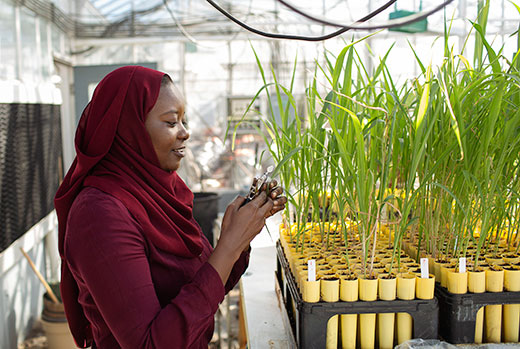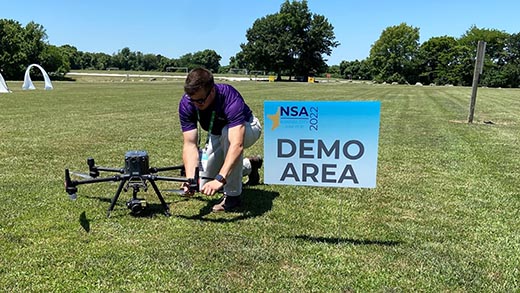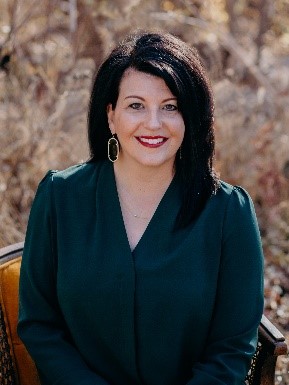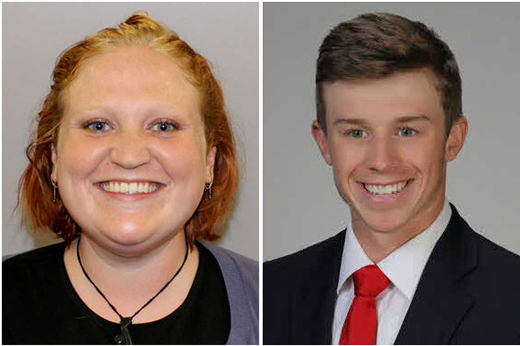K-State Current
K-State Current - July 13, 2022
K-State Current is a weekly news update for the Kansas Board of Regents to apprise the Regents on a few of the many successes and achievements made by K-State faculty, staff, and students.

K-State News
Economists study impact of international agricultural research at U.S. universities

A study of the value of international agricultural research through the U.S. Agency on International Development indicates a return of $8.52 in economic impact for every dollar invested.
An economic analysis on the impact of international agriculture research and development conducted at U.S. universities over 40 years indicates that every dollar invested provides a return of $8.52 in economic impact.
Kansas State University agricultural economist Timothy Dalton is reporting results from a study of projects completed between 1978 and 2018 and funded by the United States Agency for International Development through its Collaborative Research Support Program, and Feed the Future Innovation Labs.
The research looked at USAID projects representing an investment of $1.24 billion to support agricultural development and improve food security around the world. Those projects returned $10 billion in economic impact, according to Dalton.
Much of the work is done by agricultural scientists at U.S. land grant universities.
“These university-funded programs positively impact the most vulnerable populations in low- and middle-income countries,” Dalton reported. “Those living in poverty on less than $5.50 per day receive 78% of the research benefits, and nearly 30% of those receiving benefits live in extreme poverty on less than a daily net income of $1.90.”
Dalton and Keith Fuglie – an economist with the USDA’s Economic Research Service – have co-authored a paper documenting the high return to investment in agricultural research and development. Their report is now available online from the Cambridge University Press.
“Agricultural productivity is one of the most powerful tools we have for promoting food security and equitable economic growth in low-income countries,” Fuglie said. “When you raise agricultural productivity, you are improving the incomes and welfare of some of the most undernourished and poorest people in the world.”
The authors found what they termed “high return investments” in such areas as integrated pest management technologies; new varieties of cereals and legumes; and in alleviating post-harvest losses through improved storage practices.
“University investments in international agricultural research have delivered significant benefits for reducing poverty and improving nutrition for these low income populations,” Fuglie said.
Dalton said international research provides benefits to U.S. taxpayers as well.
“We currently face insect pests in U.S. sorghum production that occurred in southern Africa in the 1980s, (and) in Latin America and the Caribbean during the early 2000s,” he said. “When these pests appeared in the U.S., we were able to hit them head-on with the knowledge we generated for farmers in those other countries.”
He added that agricultural research targets two segments of populations in low-income countries: farmers who are just getting by, and consumers in urban areas who allocate 70-80% of their budget toward food.
“When we combine these two populations, we see that (agricultural research) is lifting broad populations out of poverty,” Dalton said. “That is what makes agriculture so much different than many other investment alternatives. Investment in agriculture affects the population broadly through higher incomes or cheaper food. Investment in agricultural research and development takes time, (but) persistence pays.”
More information about this USAID funded research and its findings is available online from K-State’s Feed the Future Innovation Lab for Collaborative Research on Sorghum and Millet.
K-State Salina Applied Aviation Research Center team leads drone education at law enforcement conference

K-State Salina's Spencer Schrader demonstrates drone technology at the annual conference of the National Sheriffs' Association.
Law enforcement members from around the country were introduced to the practicality of unmanned aircraft systems by the Kansas State University Salina Aerospace and Technology Campus Applied Aviation Research Center team.
At the National Sheriffs' Association annual conference in Kansas City, Missouri, the K-State Salina Applied Aviation Research Center staff was front and center, exhibiting the latest in drone technology and how law enforcement can better utilize the technology in everyday situations.
"To be in front of hundreds of law enforcement officers from all around the country and be able to showcase the K-State Salina UAS expertise was an excellent opportunity," said Spencer Schrader, K-State Salina UAS flight operations manager. "Leading discussions on safety, the latest technology and information on our campus's professional development program will lead to life-saving measures that first responders can utilize in real-world emergency situations."
Schrader was one of the presenters for NSA Talks, an informational session on "Drones as a First Responder" and special considerations for individuals in the public safety industry. Schrader also assisted with exhibits on small UAS commercial remote pilot training, sponsored and judged the conference's drone competition and exhibition, and provided the National Institute for Standards and Technology "Bucket Challenge" for a drone competition where participants must maneuver a drone to be able to see and identify the targets in each bucket.
While the conference served as an opportunity for the Applied Aviation Research Center, K-State Salina's Professional Education and Outreach team was able to showcase its professional development training program specific for public safety individuals at the convention.
"K-State Salina remains at the forefront of training in the public safety industry," said Courtney Hoffman, assistant director of K-State Salina Professional Education and Outreach. "Our year-round programs utilize the expertise of our Applied Aviation Research Center staff to bring training and continuing education to law enforcement and public safety professionals. This is critical to provide safety and life-saving techniques to law enforcement while utilizing drones."
Join fellow public safety professionals at the upcoming Public Safety UAS Workshop at the K-State Salina campus, scheduled for Oct. 5-6. Public safety officials will learn and train with K-State Salina's UAS experts in a day of education, networking and hands-on UAS exploration. To register, visit salina.k-state.edu/research-training/applied-aviation-research-center/training/public-safety.
K-State Faculty and Staff Highlights
Shanna Legleiter new chair of the CUPA-HR Midwest Region board
 Shanna Legleiter, associate vice president for Human Capital Services at Kansas State University, has been selected to serve chair of the Midwest Region board of directors of the College and University Professional Association for Human Resources, or CUPA-HR, for the 2022-23 fiscal year. She began her term on July 1.
Shanna Legleiter, associate vice president for Human Capital Services at Kansas State University, has been selected to serve chair of the Midwest Region board of directors of the College and University Professional Association for Human Resources, or CUPA-HR, for the 2022-23 fiscal year. She began her term on July 1.
Legleiter has served on the Midwest Region board and the Kansas chapter board, as a presenter at the CUPA-HR annual conference and as an author for CUPA-HR's Higher Ed HR magazine.
CUPA-HR is higher ed HR. The association serves higher education by providing the knowledge, resources, advocacy and connections to achieve organizational and workforce excellence. Headquartered in Knoxville, Tennessee, and serving more than 31,000 HR professionals and other campus leaders at more than 2,000 member institutions and organizations around the country and abroad, the association offers learning and professional development programs, higher education workforce data, extensive online resources and just-in-time regulatory and legislative information.
K-State engineering faculty member receives American Nuclear Society Presidential Citation
 Amir Bahadori, Steve Hsu Keystone research scholar and associate professor in the Alan Levin Department of Mechanical and Nuclear Engineering, received a Presidential Citation from the American Nuclear Society for his work on radiation issues for the society. Bahadori also participated as an invited panelist for the president's special session at the 2022 American Nuclear Society annual meeting.
Amir Bahadori, Steve Hsu Keystone research scholar and associate professor in the Alan Levin Department of Mechanical and Nuclear Engineering, received a Presidential Citation from the American Nuclear Society for his work on radiation issues for the society. Bahadori also participated as an invited panelist for the president's special session at the 2022 American Nuclear Society annual meeting.
Additionally, Bahadori recently served as an invited reviewer for the National Academies of Sciences, Engineering, and Medicine report on a new low-dose radiation research program in the United States.
"These activities are all relevant to the Johnson Cancer Research Center because cancer is one of the major health effects of concern when it comes to low dose radiation exposures," Bahadori said.
K-State Student News
The write stuff: Veterinary students win cash prizes in national essay contest

Hadley Watson, left, and Nathan Jackson, both third-year veterinary students at Kansas State University, placed in the 2022 Smithcors essay contest. Both earned cash prizes.
Knowledge of the role of veterinary medicine in American history has helped two Kansas State University veterinary students win third- and fourth-place honors in the 2022 Smithcors essay contest sponsored by the American Veterinary Medical History Society.
Hadley Watson, third-year veterinary student, San Jose, California, earned third place for her essay, "Developments in the Understanding and Treatment of Feline Infectious Peritonitis: 1963-2021." She received an $800 cash prize, a complimentary one-year membership to the society and potential publication in the journal Veterinary Heritage.
Nathan Jackson, third-year veterinary student, Friendswood, Texas, tied for fourth place with his essay, "Glanders: A History." He received a $500 cash prize, a complimentary one-year membership to the society and potential publication in the journal Veterinary Heritage.
The essays were scored blindly by a panel of American Veterinary Medical History Society judges, who, after much deliberation, determined a two-way tie for fourth place. As a result, Jackson was bumped up from honorable mention and snagged the second fourth-place slot.
The winning essays were written in fall 2021 while the students were enrolled in the elective course, History of Veterinary Medicine, taught by Howard Erickson, professor emeritus of physiology and history of veterinary medicine.
"I encourage all of the students to submit their essays for the Smithcors Student Veterinary History Essay Contest sponsored by the American Veterinary Medical History Society," Erickson said. "Students in veterinary medicine have a very comprehensive curriculum, so this is no easy task. The exercise, however, provides a unique opportunity for the students to learn about the heritage of their profession by researching and writing about a veterinary history topic of their interest."
Named in honor of veterinarian J. Fred Smithcors, Ph.D., who founded the society and authored books on veterinary history, the annual contest is open to Doctor of Veterinary Medicine students in the United States, Canada and the West Indies.
More information about the Smithcors essay contest is available at avmhs.org/essay-contest.